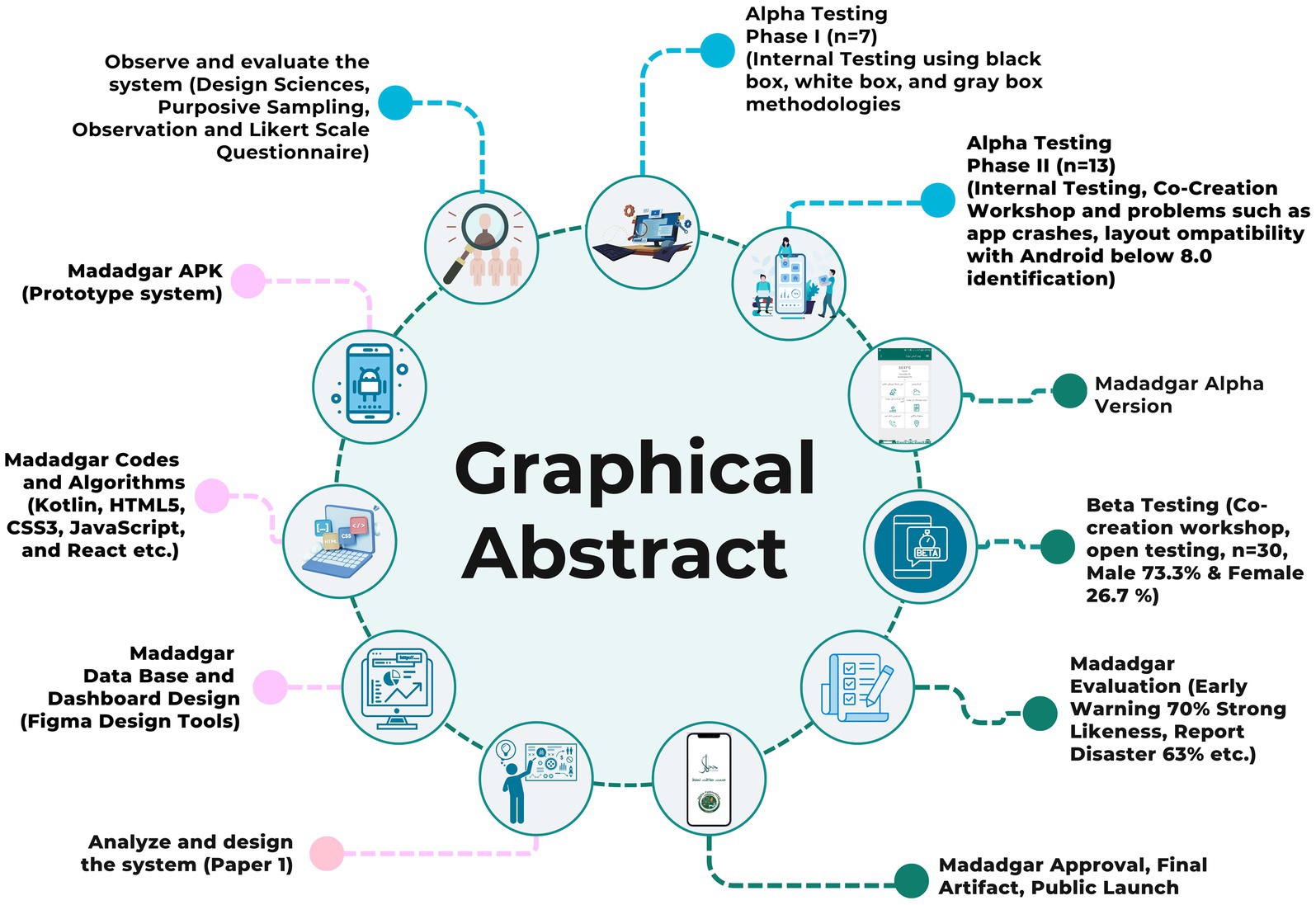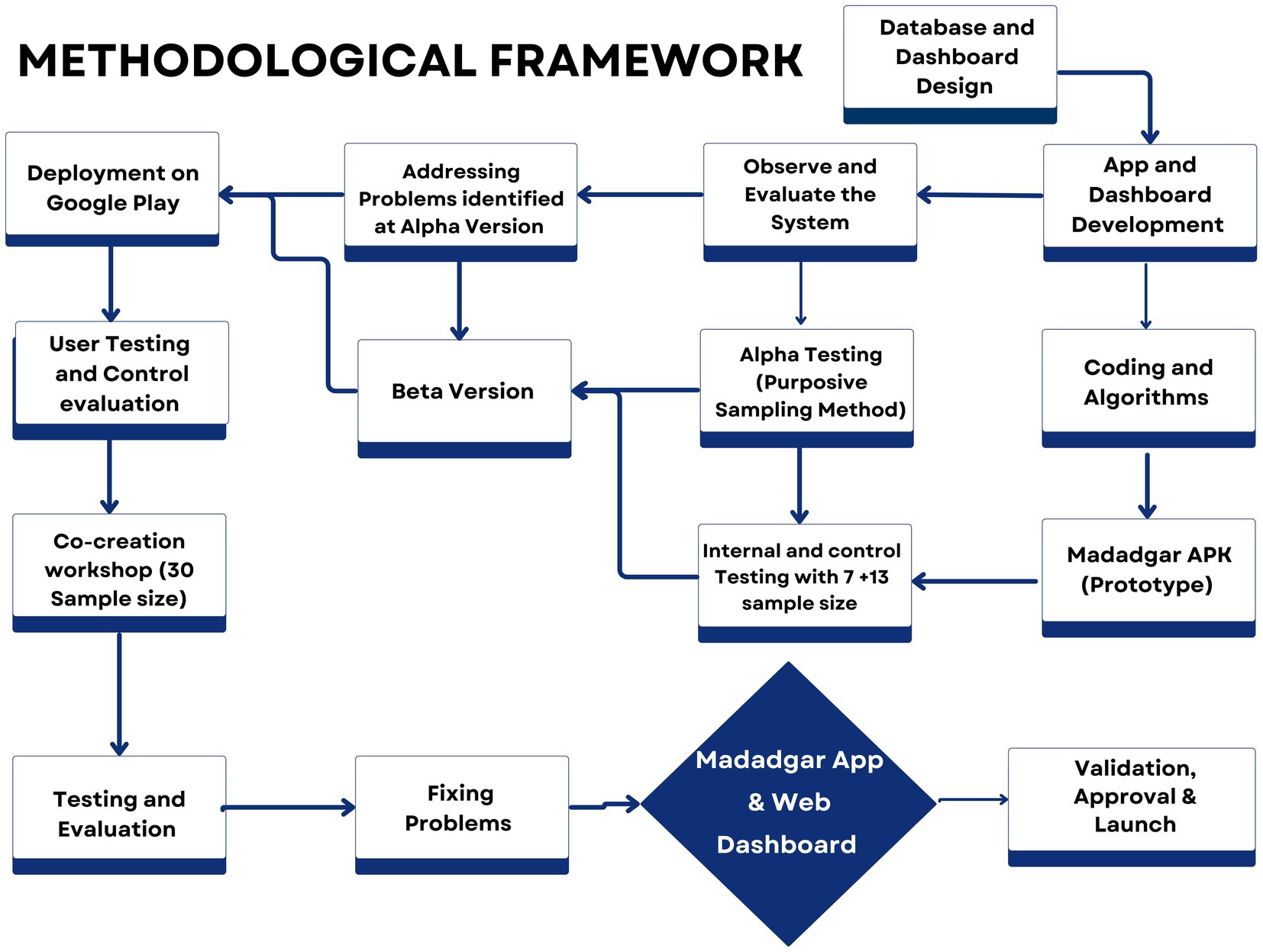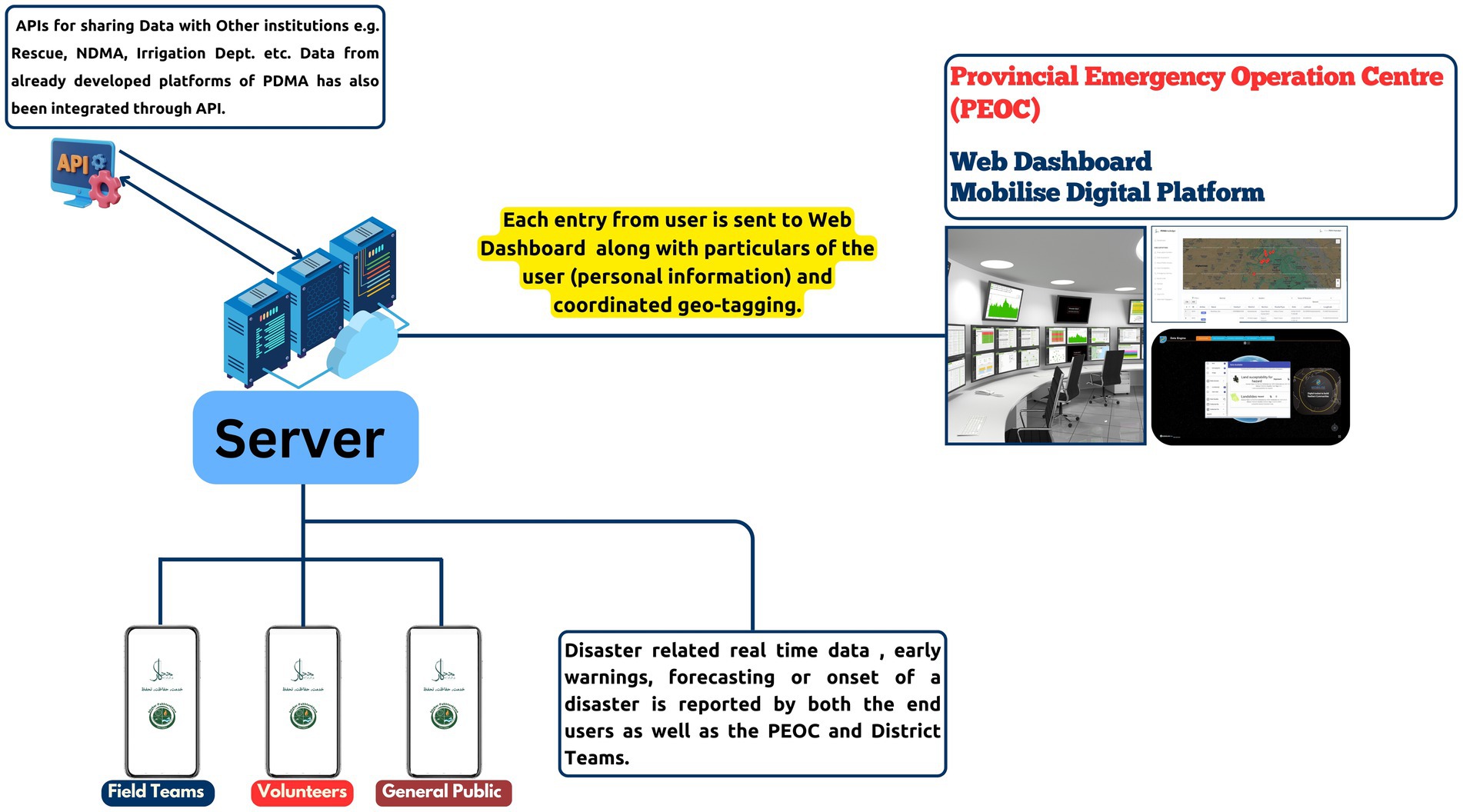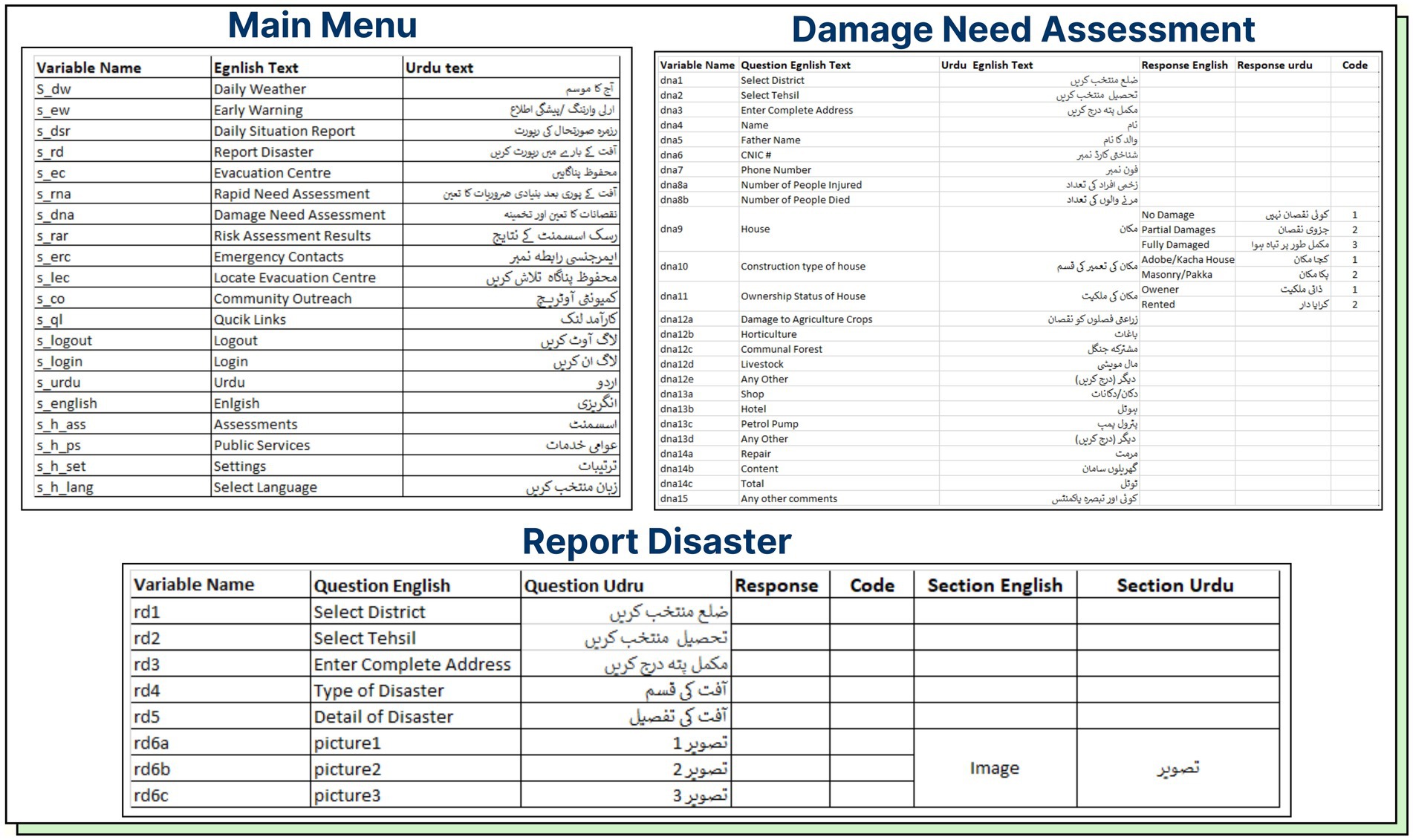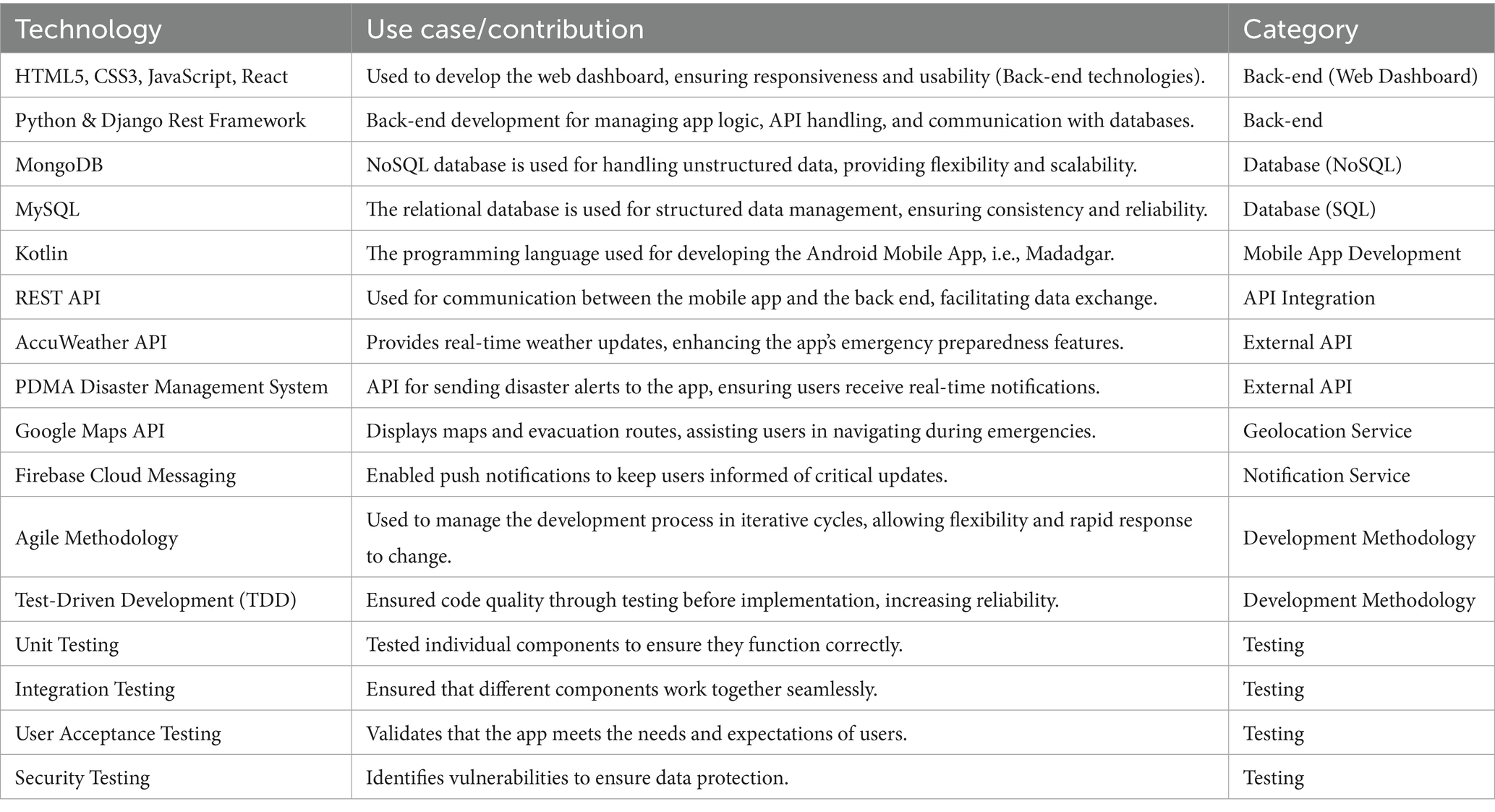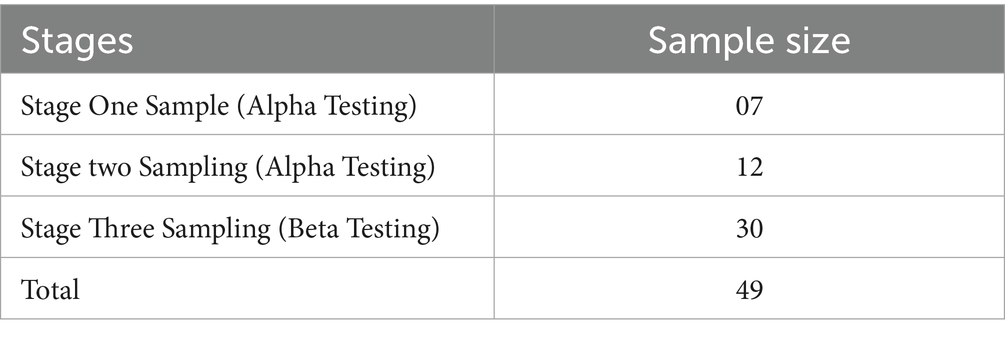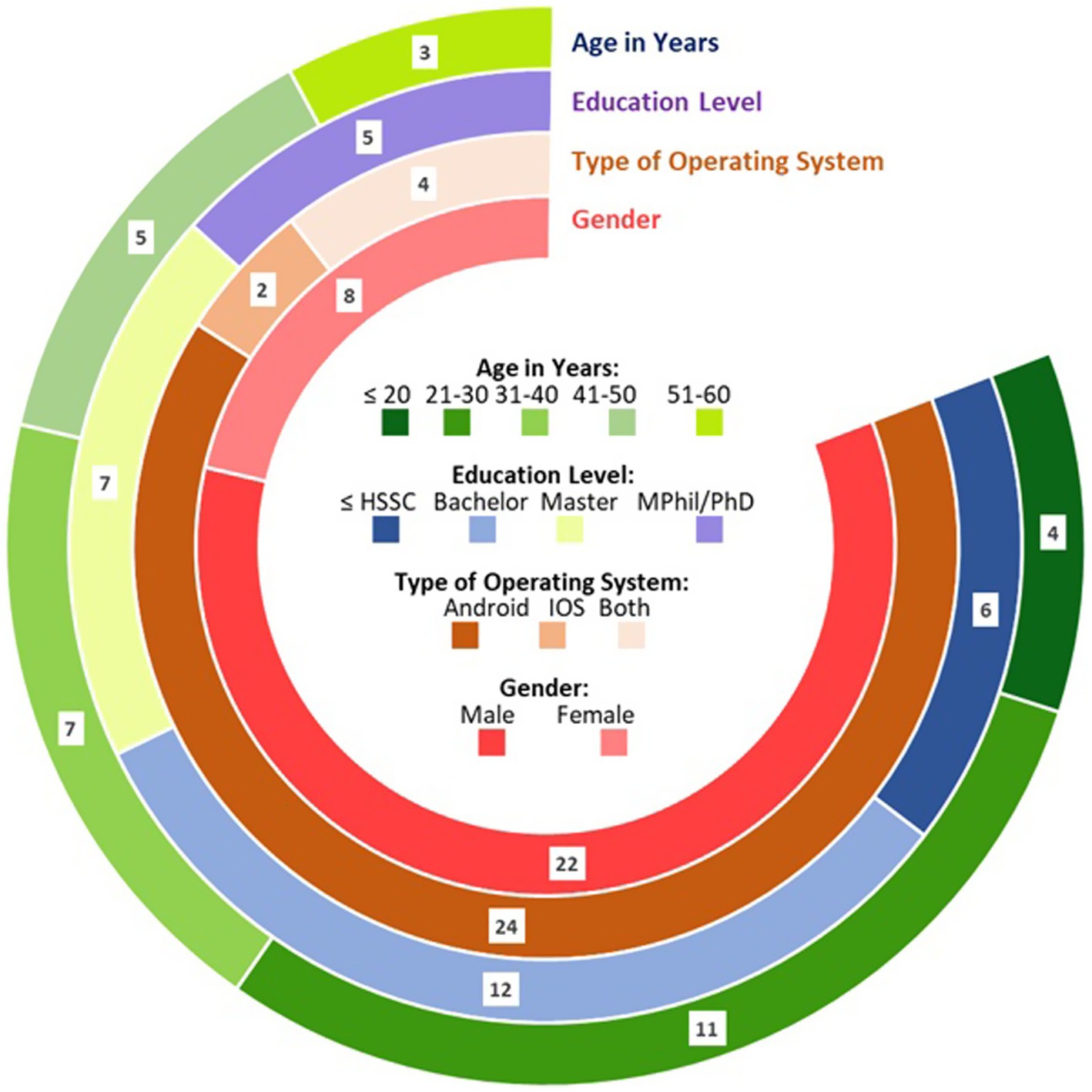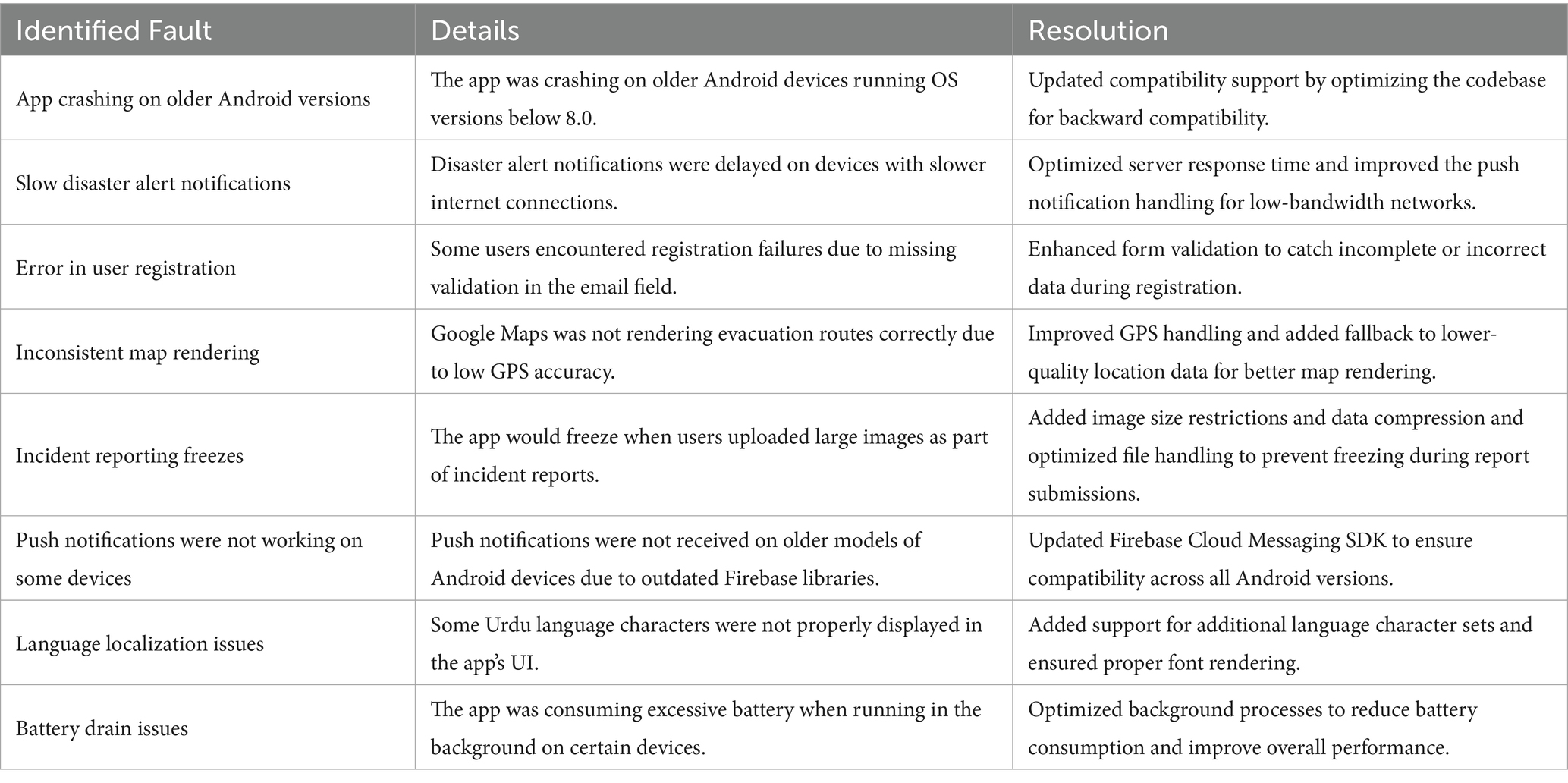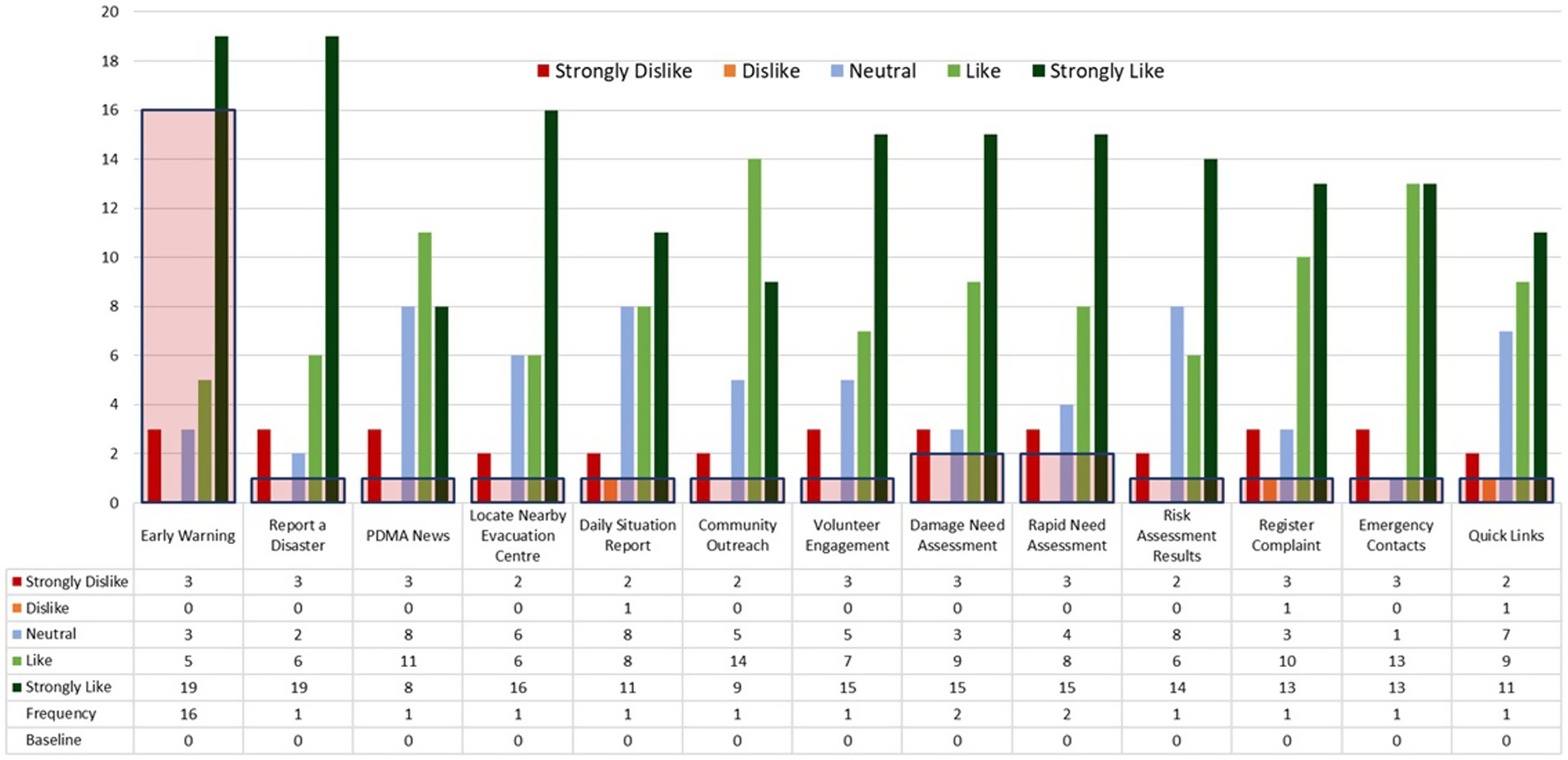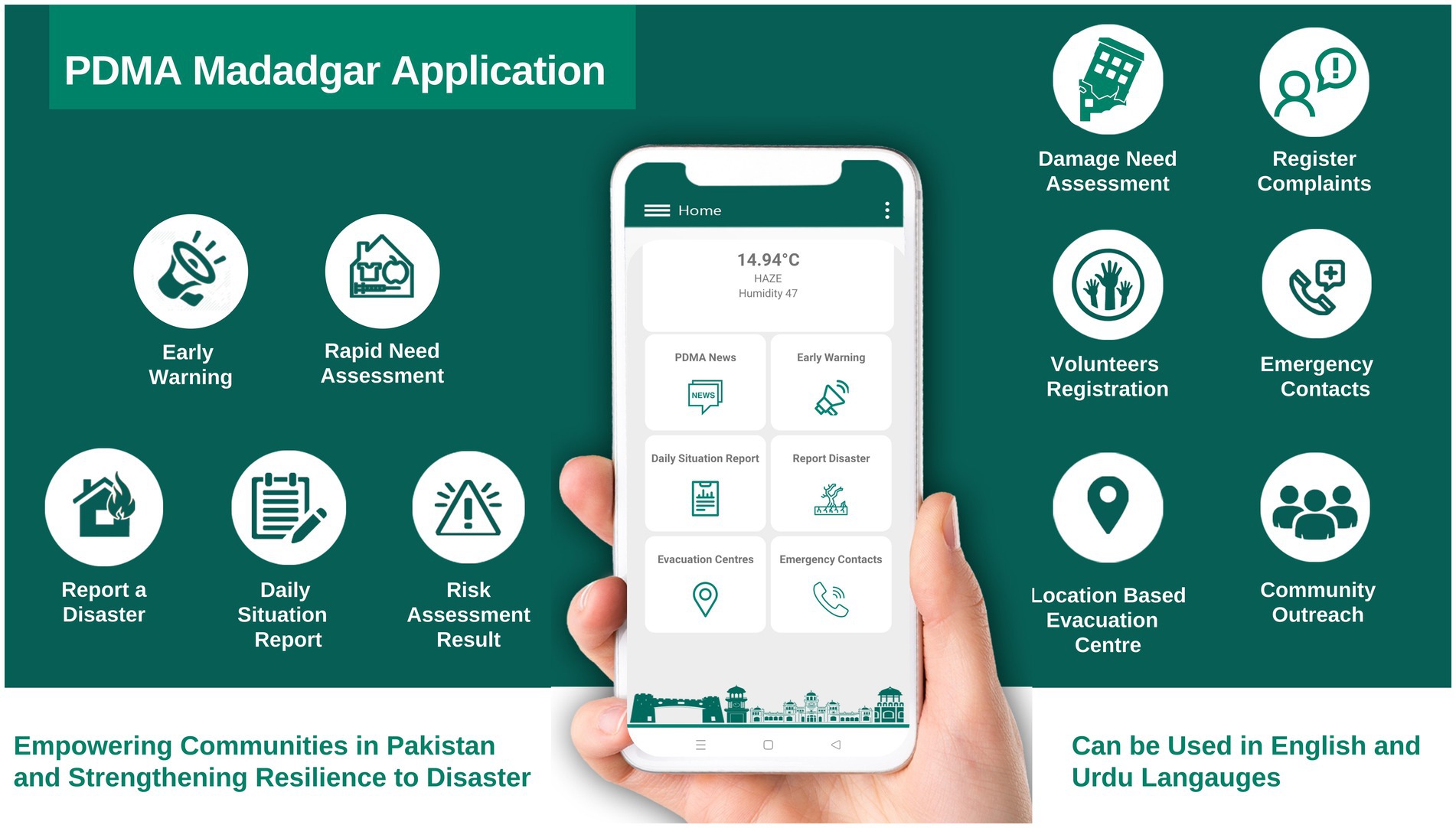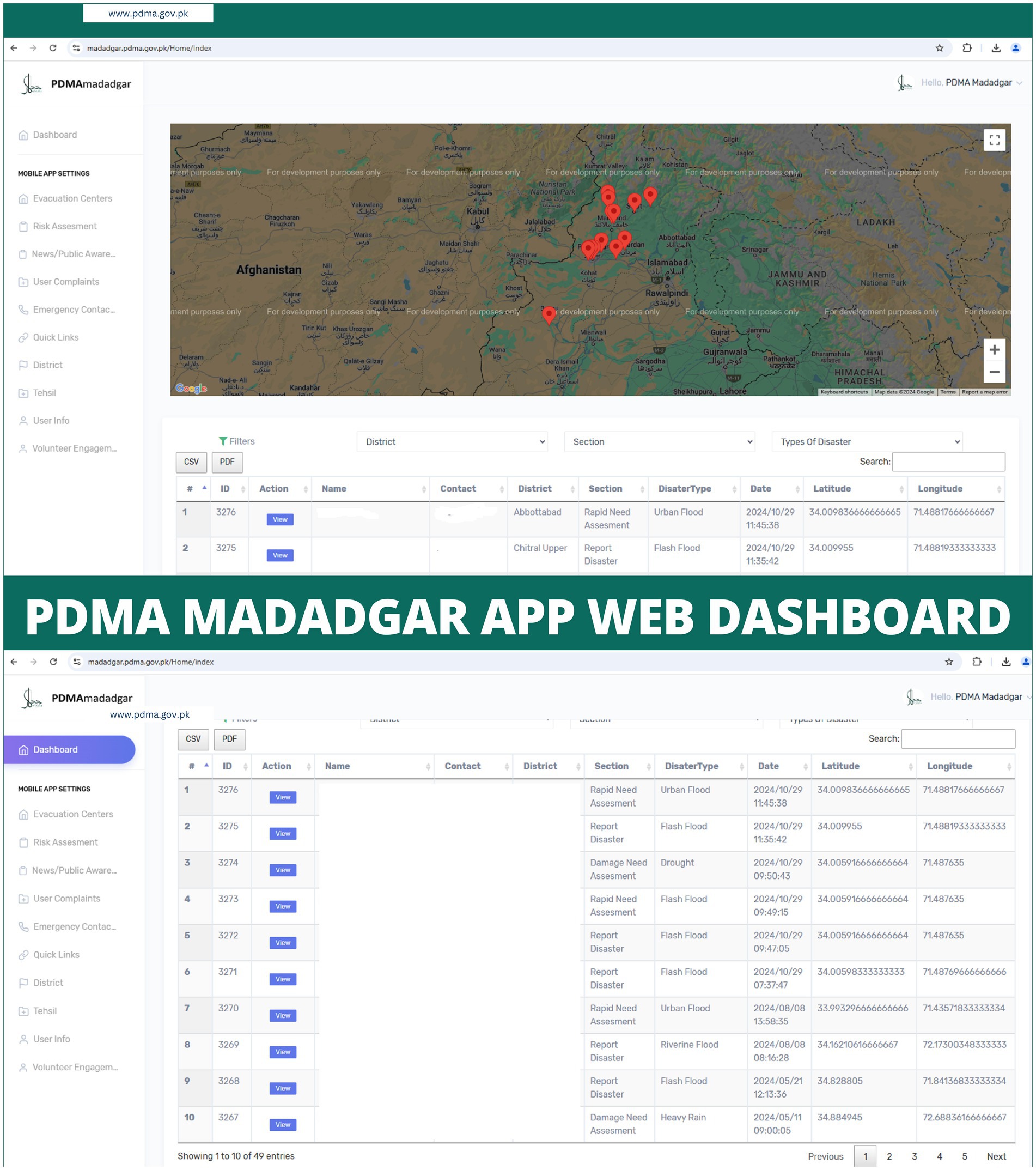- 1Centre for Disaster Preparedness and Management (CDPM), University of Peshawar, Peshawar, Pakistan
- 2Defense and Security, Rabdan Academy, Abu Dhabi, United Arab Emirates
- 3Department of Atmospheric and Oceanic Sciences, Fudan University, Shanghai, China
- 4School of Science, Engineering and Environment, University of Salford, Manchester, United Kingdom
- 5Department of Higher Education, Peshawar, Pakistan
This case study examines the PDMA Madadgar Android-based App, developed as Pakistan’s pioneer disaster risk communication platform for communities in Khyber Pakhtunkhwa province. Building on our previous work, which outlined the App’s conceptual design and architecture, this study presents findings on testing, evaluation, and the final product, i.e., the PDMA Madadgar App. We have used the Design Sciences Research methodology to collect, co-create, analyze, and present the data. A purposive sampling method was used for the selection of respondents, and the total sample size of the study at multiple stages was 49. Data regarding the app testing were collected through the observation method, and data for evaluation were collected through a questionnaire. The app underwent rigorous testing phases and control evaluation. Results indicate higher levels of interest and satisfaction of the research participants with Madadgar’s interactive features, real-time updates, and volunteer engagement mechanisms. Testing and evaluation of the results reveal a very strong endorsement and likeness for Madadgar features, i.e., early warning (86%), community empowerment in disaster reporting (63.3%), volunteer engagement (63.3%), and locating evacuation centers (53.3%). Besides, the participatory development methodology adopted for Madadgar is also guiding relevant professionals in the development of smart solutions for risk communication in the field of disaster risk reduction and climate change adaptation. Madadgar’s front-end, back-end, and database were publicly released on GitHub, enabling developers and agencies to adapt and replicate the technology for disaster risk reduction in various regions.
Highlights
• PDMA Madadgar App is Pakistan’s pioneer disaster risk communication platform for communities.
• Madadgar ensures access to early warning and empowers communities to report incidents of disasters.
• Results show high user satisfaction with Madadgar’s interactive features and real-time updates.
• Madadgar’s open-source approach enables global adaptation and replication for disaster risk reduction.
Introduction
The world witnessed a record number of 399 disasters related to natural hazards in 2023. These disasters affected 93.1 million people, killed 86,473, and caused USD 202.7 billion in economic losses (EM-DAT, 2024). A similar scenario was also observed in the year 2022 with documentation of 387 disasters, causing the deaths of 30,704 people, affecting 185 million, and economic losses of USD 223.8 billion (EM-DAT, 2023). In both these years, Pakistan was severely hit by climate-induced disasters due to its high vulnerability to the adverse impacts of climate change. Pakistan witnessed torrential rains, and a combination of flash, urban, and riverine floods created an unprecedented disaster in 2022. The government declared 94 districts as calamity-stricken. The flood killed 1700 people and affected 33 million, including 8 million displaced people (Government of Pakistan, 2022). In the 2022 monsoon season, rainfall was equivalent to nearly 2.9 times the national 30-year average. Another major disaster in 2022 was a snowstorm (16 Inches) that hit the Galyat and Murree regions and killed 22 people, mainly stranded in their cars, who died due to suffocation or cold (Ibrahim et al., 2024; Batool et al., 2024). A forest fire in 2022 resulted in the loss of lives and caused significant economic costs for local communities. In the Sherani forests of Balochistan, more than 0.9 million pine-nut-bearing trees were burnt in the blaze, and it took 13 days to extinguish. The estimated economic impact on the local community per year is USD 18.6 million, as pine nuts are the main source of livelihood on both sides of the forests (Shahid, 2024). In 2023, Biparjoy, a severe cyclonic storm, originated in the Arabian Sea. It was the longest cyclone, lasting 13 days and 3 h in the Arabian Sea, covering a 2,500 km transitional distance (Government of Pakistan, 2023b). In April 2024, the United Nations satellite imagery analysis revealed that about 9,000 km2 of land was affected by floodwater. An estimated 1.5 million people remained exposed to the flooded area. The floods damaged more than 6,000 housing units and killed 124 people (Ibrahim et al., 2025; UNOCHA, 2024). Pakistan also experienced unprecedented temperatures in 2024, with the heat wave intensifying the climate crisis, reaching record-breaking highs of 52°C in Jacobabad (Anwar, 2025; Siddiqui et al., 2025).
These recent episodes of climate change-induced disasters reveal that the country has suffered significantly from disasters (Tayyab et al., 2024; Ullah et al., 2018). It also highlights the existing vulnerabilities at the grassroots levels. The government at the national and provincial levels has promulgated laws and policies to counter disaster impacts, but financial constraints and political instability reduce the capacity to invest in disaster risk reduction (DRR) at all levels (Khan et al., 2024; Hussain et al., 2023; Khan et al., 2022). These policies include the National Disaster Management Act 2010 (Government of Pakistan, 2010), National Disaster Risk Reduction Policy (Government of Pakistan, 2013), National Disaster Management Plans 2024–34 (Government of Pakistan, 2024), National Climate Change Act 2017 (Government of Pakistan, 2017), Climate Change Policy (Government of Pakistan, 2021), and National Climate Change Adaptation Plan (Government of Pakistan, 2023a). Institutions, like the Ministry of Climate Change, National Disaster Management Authority (NDMA), Provincial Disaster Management Authorities (PDMAs), and District Disaster Management Authorities (DDMAs) have been established to execute preparedness, mitigate risk, and respond to disasters, as well as design and implement recovery strategies in case of a disaster (Jan and Muhammad, 2020). Parallel to these institutions, several other agencies like the Federal Flood Commission, Water and Power Development Authority (WAPDA), Provincial Irrigation Departments, Pakistan Meteorological Department (PMD), Space, and Upper Atmospheric Research Commission (SUPARCO), Emergency Rescue Services 1,122, and Local Governments, etc., have been mandated to carry out different structural and nonstructural projects to reduce risk and vulnerabilities to disasters (Tayyab et al., 2021; Jan and Ahmed, 2018). However, each incident of disaster exposes the deep-rooted structural and non-structural vulnerabilities in the communities across the country. Besides other reasons, one of the main reasons for these vulnerabilities is the lack of coordination (Jan and Muhammad, 2020) and risk communication strategy (Khan et al., 2020; Khayyam and Noureen, 2020). This has created mistrust among the communities of the civil protection departments, and most often, communities do not pay attention to such calls or alerts, etc. In the presence of such an unpredictable nature of disasters, there is a need to invest time, resources, and energy in enhancing disaster risk communication to ensure public awareness, reduce risk, and prepare the communities to initiate anticipatory actions.
Risk communication encompasses the systematic and purposeful exchange of information regarding disasters among government agencies, emergency management authorities, healthcare professionals, community leaders, and the general public (Agyepong and Liang, 2023). Risk communication is a vital pillar of risk management and emergency planning, facilitating the seamless exchange of information among diverse stakeholders. This collaborative process empowers experts to share critical hazard information with targeted audiences, cultivating a reciprocal dialogue that encourages active participation and informed decision-making (Fathollahzadeh et al., 2022). Risk perceptions are subjective, context-dependent, and influenced by disciplinary backgrounds. A unified language is essential for comparing risks across communities. Effective risk communication comprises multiple elements, each requiring equal consideration (Ndlela, 2023; Fakhruddin et al., 2020). It creates a culture of mutual understanding, acceptance, and risk awareness among individuals, communities, government agencies, and stakeholders. The free flow of information is crucial as it necessitates risk communication at all organizational levels. Conversely, its absence can precipitate inefficiencies in disaster management and resource depletion. To establish successful two-way communication, strategic partnerships with governmental organizations, media outlets, local leaders, and community groups are indispensable.
A wide range of tools and mechanisms are available for communicating risk to the communities. These include the traditional mechanisms (sirens, alarms, radio broadcasts, print/electronic media announcements), digital dimensions (mobile apps, social media platforms, SMS/text messaging, digital alert system, email alerts, online emergency portals, web-based tools) and interpersonal mechanisms (face-to-face communication, community outreach, volunteer networks, public addresses). These tools have been tested and used throughout the world. Within these tools, Mobile Apps have recently proved to be the most effective tools for risk communications, information dissemination, and public knowledge/awareness (Agyepong and Liang, 2023). Mobile-based Apps are crucial in disaster risk communication, offering numerous benefits from saving lives to reducing the impacts of disasters. Mobile apps provide key functions such as early warning systems, information dissemination, emergency instructions, real-time updates, location-based services, social media integration, crowdsourcing, and resource allocation (Navarro de Corcuera et al., 2022; Paul et al., 2021). Some of the well-known examples of mobile Apps making a difference at the international level include Disaster Alert globally (Pacific Disaster Centre, 2011), FEMA App in the USA (Federal Emergency Management Agency, 2011), My Earthquake Alert (JRustonApps B.V., 2015), Windy-Weather Forecast (Windyty, 2024), First Aid-IFRC (International Federation of Red Cross and Red Crescent Societies, 2018), AccuWeather: Weather Radar (AccuWeather, 2012), Clime: Weather Radar Live (Mobile Heroes, 2016), etc.
In Pakistan, mobile Apps like Pak NDMA Alert (NDMA, 2024), Flood Reporting App (Khyber Pakhtunkhwa Information Technology Board, 2022), PMD Weather App (Pakistan Meteorological Department, 2021), Pakistan Citizen Portal (Prime Minister’s Performance Delivery Unit, 2018) and Pakistan Weather Forecast 2023 (Unisoft Apps, 2018) are some of the apps being used for disaster risk communication. The majority of the Pakistani Apps are static and used for unilateral announcements. The Citizen Portal app is the only app that enables citizens to file complaints against any government department, including the disaster management authorities (Prime Minister’s Performance Delivery Unit, 2018). There is no real-time feature for early warning or other risk communication in the Citizen Portal app. The remaining apps provide information related to hydrometeorological phenomena. The Pak NDMA Alert App is dedicated to issuing alerts to the citizens regarding any approaching threatening event (NDMA, 2024). But this app also uses a one-sided information-sharing approach with no mechanism for the communities to share information with the authorities. Keeping in view the significance of the interactive mobile apps for disaster risk communication, we developed an Android-based mobile app known as the PDMA Madadgar App to be utilized by PDMA and communities across the KP province. Administratively, the admin panel of the App has been handed over to PDMA due to its mandated role in DRR as per the National Disaster Management Act-2010 (Government of Pakistan, 2010). Madadgar is Pakistan’s first-ever disaster risk communication system to build resilience against disasters in KP province through a citizen science approach. The basic aim of the development and deployment of this mobile app is to reduce disaster risk and strengthen coordination and collaboration among communities and authorities in the KP province. Madadgar engages communities in DRR and emergency management through a smart, intelligent, and collaborative mechanism that minimizes service delivery time to vulnerable communities. In our previous study on the Madadgar App, we communicated about the Madadgar conceptual model and architecture. In the present study, we have conducted alpha, beta testing, and evaluation with the app users. We have also unveiled and shared the codes of Madadgar on GitHub on humanitarian grounds in this study. These codes will help enable disaster management agencies, departments, and authorities in vulnerable countries to adopt and replicate the technology for resilience-building against disasters.
Materials and methods
This study aims to test and conduct an evaluation of the Madadgar app. Specifically, it seeks to assess the app’s development process, alpha-beta testing, user evaluation, and final product. The study also examines the useability and likeness of different features of the Madadgar App. To achieve the study objectives, we have used the design science research methodology (DSRM) for app testing and evaluation, which is a problem-solving approach used in information systems, software engineering, and other fields to design and develop innovative solutions, such as mobile apps. It focuses on creating artifacts (e.g., apps, systems, and models) that solve real-world problems. Through the creation and evaluation of purposeful artifacts, DSRM effectively redefines reality, addressing human needs and challenges (Venable et al., 2017). Venable suggests six phases of the DSRM, i.e., construct a conceptual framework; develop a system architecture; analyze and design the system; build the system (prototype); observe (test); and evaluate the system. We have used the first three steps of this methodology in our previous work on the Madadgar conceptual design and landscape analysis. We have used the remaining steps in this study, as mentioned in Figure 1.
Development of artefact: dashboard and database design
PDMA Madadgar App dashboard and database design are crucial aspects. The dashboard serves as the central hub, providing users with critical information and functionality through an intuitive and simple design (see app architecture in Figure 2). Key considerations included customizable widgets displaying relevant data, real-time updates, and personalization. The dashboard comprises five primary components: the Home Screen, offering an overview of disaster risk information and alerts specifically early warnings; Maps, providing visual representations of disaster-prone areas; Geo-tagged Evacuation Centers, directing users to locate these centers with safe evacuation routes; Alerts, sending push notifications for critical events and news updates on any emergency; Reports, user-submitted incident reports; and Resources, granting access to emergency contacts, awareness material, and tutorials. The database design prioritized efficient data retrieval, security, and scalability. Four primary tables store User Profiles, Incident Reports, Damage/Rapid Need Assessments, and Emergency Resources, like critical contacts and evacuation centers (see Figure 3 & download the “Data Dictionary used in the app as Supplementary item 1).
Rigorous internal and external testing ensured the dashboard and database design met the standards. Unit testing verified individual component functionality, integration testing confirmed seamless interactions, and User Acceptance Testing validated user experience and functionality. The PDMA Madadgar App’s dashboard and database designs provide a solid foundation for effective disaster risk communication, adhering to the user-centered and problem-focused approach. For UI/UX design, we used the Figma Design Tools.
App development
The App development part has utilized advanced technologies in various components to ensure optimal performance and functionality (Table 1). Each component of the app and dashboard has been built using cutting-edge tools and methodologies. The web dashboard, i.e., the front end, was created using HTML5, CSS3, JavaScript, and React, which enabled a seamless user experience (Syedpg, 2025a). The back-end services were developed with Python, integrated with the Django Rest Framework, and supported by MongoDB (a NoSQL database) and MySQL (for relational data management) (Syedpg, 2025a,b). The mobile app, developed in Kotlin, communicates with the backend through REST APIs. External API integration, such as AccuWeather for real-time weather updates and PDMA Disaster Management Information System (DMIS) for disaster alerts, enhances the app’s functionality. The app is fully compatible with Android operating systems.
The development follows agile methodologies, allowing for iterative progress, continuous testing, and refinement. Design thinking ensured that user needs remained central throughout the process. The use of Test-Driven Development (TDD) guaranteed code quality, with a comprehensive testing suite that included unit testing, integration testing, user acceptance testing, and security testing to ensure data protection. Additional technologies, such as Google Maps API, were integrated for displaying maps and evacuation routes, while Firebase Cloud Messaging enabled push notifications for critical updates and alerts. We used efficient data structures and algorithms for better performance.
Sampling method and sample size
For the selection of research participants and respondents, we have used a purposive sampling method. The testing and evaluation were carried out in three different phases. In phase one, we sampled a group of 7 research participants comprising the Mobilise Project team, DRR Experts at the University of Peshawar, and IT Officials of PDMA. In phase two, we invited a group of 12 research participants, representing 10 key DRR organizations, to a co-creation workshop. These participants actively contributed to the preparation of the conceptual design of the PDMA Madadgar App. In the third phase, we sampled a group of 30 community volunteers from four different humanitarian, advocacy, and academic organizations working on DRR, response, and recovery in the province. These organizations are the Civil Defence Department, Pakistan Red Crescent Society (PRCS), Alkhidmat Foundation (AKF), and Centre for Disaster Preparedness and Management (CDPM) Volunteer Club. Volunteers from Civil Defence, PRCS, and AKF are field-based community volunteers responding to emergencies, creating awareness, and contributing to building resilient communities. The CDPM Volunteers are technical professionals in DRR and climate change adaptation. Table 2 provides a detailed breakdown of the research sample size.
Data collection and analysis
Multiple methods were used to collect the data, including observation, a co-creation workshop, and questionnaires. In the alpha testing, we sent and installed the App on the mobile phones of 7 research participants, comprising the Mobilise Project team, DRR Experts, and Officials of the PDMA. We individually contacted all participants, conducted a demo through a face-to-face setting, and asked them to navigate the app. We recorded their feedback in real-time and noted the problems they faced with in-app installation, functionality usage, navigation, etc., in an Excel project document (Supplementary item 2). This process was completed in 2 weeks. Once all the data had been collected, the software engineers started fixing the problems reported and encountered by the testing team. Soon after, we arranged a joint co-creation workshop of the app development team with the participants who contributed to the PDMA Madadgar App conceptual model, representing ten key organizations. The co-creation workshop was attended by 12 research participants. The comprehensive alpha testing approach integrated multiple testing techniques, including exploratory testing, unit testing, integration testing, and functional testing. Testing methodologies encompass compatibility across diverse devices, operating systems, and screen sizes. Usability testing enhanced user experience, performance testing optimized speed and responsiveness, and security testing mitigated potential vulnerabilities. The problems identified at the Alpha level were incorporated into the APK, and an alpha version validated by the research participants was developed and installed in the Google Play Store.
For beta testing, a second co-creation workshop was conducted with the volunteers of the four different organizations mentioned above. The workshop was aimed at gathering feedback and insights from stakeholders and end-users on the alpha version of the Madadgar, identifying areas for improvement, and ensuring the app meets user needs. During the workshop, we delivered a demo of the Madadgar alpha version and opened the floor for discussion. After the initial discussion, the group was asked to install the app and conduct hands-on testing for feedback collection. Qualitative feedback was collected by our team for each user, their device type, and the problems they faced. Soon after the feedback collection, they were handed a short Likert scale questionnaire to evaluate the main features of the app. Testing data regarding the problems observed and experienced were stored in the Excel project document in real-time (Supplementary item 2). The quantitative data regarding their feedback on the feature’s likeness was analyzed through frequency and percentage distribution and has been presented in the data analysis section.
Results
This section presents data and results of the alpha testing, beta testing, and Madadgar features evaluation.
Demonstration: alpha testing
To validate Madadgar functionality and performance, identify and fix critical bugs, and gather internal stakeholder feedback, the app underwent Alpha testing. The said testing occurred on Android smartphones and tablets utilizing Wi-Fi, 4G, and 3G networks as well as online/offline GPS locations. Employing black box, white box, and gray box methodologies, testing scenarios included user registration, disaster alert/early warning notifications, emergency contact directories, community outreach, incident reporting, and damage need assessment, etc. This process uncovered several critical issues. Notable key functional issues included inconsistent navigation menu behavior, failure to load emergency contact information, incorrect disaster alert notifications, and inability to access offline resources. Furthermore, usability testing revealed several design problems, including inconsistent font sizes and styling, and inadequate feedback on user actions. Additionally, unit testing identified significant concerns, such as slow loading times on low-end devices, app crashes on Android 8.0 or below devices, and excessive battery consumption. Moreover, security and technical testing identified critical vulnerabilities, including insecure data transmission, inconsistent API response times, slow response times, and the need for database schema optimization.
Some of the suggestions of the participants include a checkbox as a declaration for a user to avoid false reporting, notification settings on the web dashboard for entries coming from the communities, action logs at the backend, personalized emergency alerts (SOS Messages) for volunteers, push notification services, interactive public awareness content, download facility, and social sharing capabilities. Other recommendations include adding functionality for signing up with a mobile number along with the email, features for evidence attachment into the “Complaint Section,” a user profile section to the app settings, a feature for updating data, and adding a color background to the login and password section.
In response, we comprehensively addressed these concerns through a multi-faceted approach, including conducting thorough code reviews and refactoring, implementing automated testing, enhancing user experience through intuitive design, prioritizing performance optimization, and resolving technical debts and security concerns. To address the risks, mitigation strategies such as implementing SSL/TLS encryption, robust authentication mechanisms including JWT token-based API authentication and authorization input validation, secure storage, and dependency updates were adopted to ensure user data protection and app reliability. An action plan was developed comprising the tasks assigned to the development team for bug fixing and feature enhancement (weeks 1–2), re-testing and validation (week 3), beta testing with a larger user group (weeks 4–7), and scheduling regular maintenance and updates. Over four weeks–three for testing and one for defect fixing–critical bugs were identified and fixed, performance improved, and functionality validated. The end product was an alpha design for uploading to the Google Play Store after a validation meeting with the group.
Beta testing
The beta testing was held with a group of 30 research participants/respondents. As shown in Figure 4, the demographic analysis of primary data reveals respondents’ distribution across distinct age cohorts and gender. The gender distribution exhibits that males comprise 73.3% of the respondents, whereas females account for 26.7%. This 2:1 (male-to-female) ratio is due to the cultural restrictions on women’s participation in social affairs in their communities. The respondent’s age distribution is characterized by two dominant groups, i.e., individuals aged 21–30 years (36.7%) and those aged 31–40 years (23.3%), which collectively account for over half of the study population. The educational landscape is characterized by higher education, with 40% holding undergraduate degrees, 23.3% with Masters degrees, and 16.7% MS/MPhil/PhD. Only 13.3% had education up to and below the Higher Secondary School Certificate level. The analysis of the mobile ecosystem indicates that a significant majority, i.e., 80% were Android operating system users and 6.7% were IOS operating system users. Notably, 13.3% of users utilized both Android and IOS operating systems. Below are the summarized results of beta testing followed by the app features description and evaluation.
At the beta level, the App has undergone rigorous testing to solicit constructive feedback from research participants as end-users to solve residual defects. Utilizing a comprehensive range of devices (Android smartphones and tablets) and networks (Wi-Fi, 4G, 3G, and 2G). This process was divided into two steps. In step one, we checked user registration, disaster alert notifications, early warning messages, PDMA news, damage and rapid need assessment, volunteer engagement, emergency contact directories, incident reporting, and grievance redressals. Device fragmentation issues across various Android versions and devices were noted. Android version-specific issues included app crashes and permission problems. Device-specific issues were identified on Samsung, Huawei, Xiaomi, and Google Pixel devices, such as screen orientation and theme conflicts. Additionally, screen size and density issues caused layout, font rendering, and navigation menu inconsistencies. These issues were resolved by implementing Android version-specific code branches, using compatible libraries, conducting thorough testing on diverse devices, and optimizing layout and design. Mobile network bandwidth-related issues significantly impacted app performance in beta testing. Testing on multiple devices across Jazz, Telenor, Zong, and Ufone mobile networks revealed slow data speeds (2G: >10s, 3G: 5–10s, and 4G: 2–3 s). Network congestion (high latency, packet loss), frequent disconnections, and excessive data consumption were also noted. These issues delayed emergency alerts and prevented resource downloads. To address these issues, optimizing app data usage through compression and caching was performed, network retry mechanisms were implemented, offline support was provided and an ongoing network testing function was added. Table 3 provides details of some of the key technical issues identified and fixed during the alpha and beta testing.
Quantitative results of Madadgar evaluation
In this section, we present the features of the final artifact, i.e., PDMA Madadgar App and Dashboard. Figure 5 provides data collected from respondents regarding the evaluation of the Madadgar App during the beta testing level. The Madadgar consists of 13 major tabs with further subdivisions (see Figure 6 for app features and Supplementary material 3 for details of Tabs). The Early Warning component of the App is of paramount significance for the communities. The Madadgar promptly and directly communicates Early Warning messages to communities across the province, providing longer lead times for vulnerable communities and field teams to take action or initiate evacuation or prepare in advance. The “Early Warning” tab provides data about the Early Warning messages, Weather Forecasts, Weather Advisories, Flood Bulletin, GLOF Alerts, latest Earthquake Events, and Drought information. Figure 5 shows that the Madadgar Early Warning feature received significant approval with a substantial majority (70%; n = 21/30) exhibiting strong affinity (Strongly Liked). This robust endorsement suggests that users perceive the feature as a valuable tool for enhancing disaster preparedness and response. Furthermore, a notable proportion (16.7%; n = 5/30) expressed moderate approval (Liked), indicating overall user satisfaction with the feature’s efficacy. To counter the linear paradigm in the early warning system, a tab of “Report Disaster” enables communities to share information with the Provincial Emergency Operation Centre-PDMA (PEOC-PDMA) about the disasters that occur without a warning, for example, earthquakes, landslides, flash floods, GLOFs, fire, etc. Before the Madadgar App, there was no digital mechanism to ensure the communication of information to the authorities for initiating a response. The app users can upload up to three pictures of the affected locality along with the geo-tagging for information. This feature is also very important in rescuing people trapped in a disaster site because of the pinpoint location services embedded with reporting. The emergency responders can directly reach the victims instead of roaming to search the victims. The “Report Disaster” feature is helpful in modeling disasters and their geographic spread, bringing citizen intelligence to the domain of tracking and tracing disasters. The evaluation of this feature revealed high user acceptance, with 63% (n = 19/30) exhibiting strong likeness and 23.3% (n = 7/30 only liked) expressing moderate approval. These results demonstrate the feature’s effectiveness in enhancing disaster reporting efficiency and response. Parallel to this tab, the “PDMA News” tab is also very important. All types of critical information are sent to the communities via the App with a push notification alert for the news section. This feature is used for communicating the tracking of active hazards, disasters, or humanitarian situation announcements. For example, on October 29, 2024, an announcement was made that PDMA had released 360 million rupees to insurgency-affected people of South Waziristan and the amount will be credited to around 18,000 beneficiaries’ mobile wallets. This announcement also sent information that in case of any issue, the beneficiaries can file complaints. Data in Figure 5 revealed that 36.7% of respondents (n = 11/30) exhibited moderate approval, while 30% (n = 9/30) demonstrated strong approval for the PDMA News tab. The combined results (66.6%) reveal that users perceive the feature as a valuable information source.
The location-based “Evacuation Centers” tab provides a complete repository of the identified evacuation centers in the province, along with safe evacuation routes (179 evacuation centers in 35 districts). Coordinates of these 179 evacuation centers have been added to Madadgar and with one click, it directs the people to take anticipatory action in time of need. In this regard a substantial majority of the respondents (53.3%; n = 16/30) strongly endorsed and 20% (n = 6/30) expressed moderate approval for the evacuation centers feature. Communities can utilize the “Register Complaint” tab to submit grievances concerning disaster-related problems, including but not limited to faulty risk assessment, discrepancies in damage compensation, inaccurate damage assessment, or issues with the response. The complaint feature received substantial user approval, evidenced by 43.3% (n = 13/30) of respondents indicating a strong preference and 33.3% (n = 10/30) showing moderate approval. This overwhelming endorsement (76.6% combined approval) underscores the feature’s critical role in facilitating community-centric and effective problem reporting and its resolution. The “Damage Need Assessment” tab enables communities and authorities to conduct post-disaster damage assessments through a digital platform. Previously, an analog system was in place with so many transparency and accountability issues. Similarly, PDMA can quickly conduct a “Rapid Need Assessment” during an emergency to identify the survivors’ immediate needs and send targeted support. Damage Need Assessment feature revealed significant user endorsement, with 80% of respondents (n = 15/30 Strong Likeness and n = 9/30 Likeness) exhibiting strong endorsement. The essential function of this feature optimizes disaster recovery efforts. A similar trend was noted in data for the “Rapid Need Assessment” feature. The “Risk Assessment” provides access to summarized information with maps from the risk assessment studies in the region ensuring the accessibility of information for risk-informed decisions. A total of 66.7% of respondents (Strong Like n = 14/30& Like n = 6/30) demonstrated the Risk Assessment feature’s significance in reinforcing risk management capabilities and resilience.
PDMA releases its “Daily Situation Report” providing information about the occurrence of a disaster, humanitarian situation, and response information. This information is vital for the decision-makers to take action to mitigate emergencies. A repository of the situation reports has been made public through Madadgar and anyone who needs information about any specific disasters and associated damage can download it in a few seconds. Evaluation data reveal that 36.7% (n = 11/30) of respondents strongly liked and 26.7% (n = 8/30) liked the situation report feature, highlighting its importance in facilitating timely and informed decision-making. Public awareness messages in the form of posters have been made accessible via the “Community Outreach” tab. Besides, pictorial messages and social media pages, including the PDMA YouTube channel, Facebook page, X handle, and LinkedIn account, are accessible from here. Community Outreach/Public Awareness feature revealed significant acceptance, with 76.7% of respondents (n = 23/30) expressing moderate to strong preference underscoring its significance in enhancing community engagement and awareness. “Emergency Contact” provides access to all emergency numbers with the office numbers of the 35 District Disaster Management Officers. A total of 86.6% of respondents (n = 26/30) showed strong to moderate preference for the Emergency Contact feature, demonstrating its critical importance. The Quick Links tab is a repository of websites of all organizations working on DRR, climate change, and sustainability in Pakistan. Out of the total, 36.7% strongly liked and 30% liked this feature. The last tab provides access to the privacy policy of the App. Another significant feature of the Madadgar is volunteer engagement. Both the app and dashboard facilitate effective volunteer management through their robust registration and engagement features. Volunteers receive timely notifications and alerts for emergency responses, ensuring swift mobilization. The app’s task assignment optimizes volunteer deployment based on proximity and availability. Furthermore, volunteers can manage their profiles and indicate availability. Evaluation data shows that the Volunteer Engagement feature received overwhelmingly positive feedback, with 90% (n = 27/30) of respondents expressing approval. Specifically, 63.3% (n = 19/30) strongly liked the feature and 26.7% (n = 8/30) liked it. This suggests that users highly value the feature for effective volunteer management and coordination, and its integration is crucial for enhancing volunteer experiences and community engagement. A detailed visual of the Madadgar tabs has been presented in Figure 6; Supplementary material 3.
The Web Dashboard seamlessly communicates with the App and all information that is sent via the app is received with a notification message on the web dashboard (Figure 7). The web dashboard of the Madadgar has been integrated into the DMIS of the PDMA and any report from the communities is directly assigned to the concerned district administration. PDMA-PEOC can send updates, news, early warning messages, public awareness messages, etc., via the dashboard. The dashboard has been hosted on the provincial government server ensuring data privacy and security of information. Each report received from the communities an action is initiated. The dashboard creates digital logs for each action. This regulates the behavior of the employees of the PEOC and district administration as these logs are shared regularly with the key officials.
Approval by the relevant bodies
After the alpha, beta testing, and evaluation, the app performance, user experience, bug fixing, etc., was presented in a validation workshop at the Government of KP Relief, Rehabilitation and Settlement Department (RRSD), which was chaired by the Secretary RRSD. The workshop was attended by stakeholders from PDMA, Emergency Rescue 1,122, the Civil Defence Department, the IT board, and the Science and Technology Department. The app was approved and a public launching ceremony was recommended. We as a Mobilise team, handed over the full control of the Madadgar to the PDMA, KP.
Discussion
The Madadgar initiative has demonstrated efficacy in addressing key DRR challenges in Pakistan, specifically enhancing risk communication, early warning system accessibility, community resilience, and inter-organizational coordination. Several recent research studies have identified that there is a critical gap in the communication of early warning to communities (Shah et al., 2023; Ahmed et al., 2022; Manzoor et al., 2022; Rana et al., 2021; Ahmad, 2020; Perera et al., 2020). The early warning system in the KP province still needs further improvement but the data of the existing early warning system is not systematically communicated to the people. Building on these gaps, Madadgar ensures timely access to early warning messages across the KP province. Madadgar also counters the existing linear paradigm in the early warning system. Local communities have been empowered to be active contributors to the early warning system and they are bringing citizen intelligence to the tracking of active hazards. Previous studies have also emphasized the inclusion of local communities in early warning systems, risk communication, and disaster risk reduction (Rahman et al., 2025; Jan et al., 2024; Otto et al., 2023; Kitazawa and Hale, 2021; Fekete et al., 2021; Ali et al., 2021; Sufri et al., 2020; Ahmad, 2020; Jan, 2018). Ideally, disaster risk assessment and forecast require robust, up-to-date datasets and technologies. Fortunately, citizen science, fueled by mobile devices, Web 2.0, and participatory research offer complementary solutions addressing data gaps and enhancing assessment capabilities and subsequent forecasts (Sy et al., 2019). Madadgar is heavily relying on citizen science engaging local communities and volunteers to gather local data and report it to the PDMA-PEOC for subsequent actions. The integration of citizen science in DRR yields numerous benefits. Primarily, citizen-generated data enhances data quality, increases coverage, especially in data-scarce countries, like Pakistan, and provides real-time reporting during disasters. Additionally, it fosters community engagement, promoting public awareness, education, and participation in DRR, while reducing costs associated with traditional data collection. These primary benefits have secondary implications, including improved forecasting, expedited early warning dissemination, social mobilization, capacity building, and informed research agendas. Successful implementation of Madadgar-based citizen science includes flood monitoring, where citizens report water levels to calibrate flood models; weather monitoring through Madadgar weather services as well as reporting local weather situation to authorities; earthquake reporting to assess the damage; landslide monitoring and tracking soil moisture and flood monitoring to inform evacuation decisions.
Another key aspect of Madadgar is the volunteer engagement. Volunteers are indispensable in DRR, especially in the response phase they provide vital support to emergency management services (Daddoust et al., 2021). For effective risk reduction, the engagement of diverse stakeholders is necessary. The Sendai Framework for Disaster Risk Reduction stresses that successful DRR necessitates an inclusive, multi-stakeholder approach, encompassing NGOs, government agencies, community groups, and other relevant actors (Alam and Ray-Bennett, 2021; Seddiky et al., 2020; Kelman, 2015). The PDMA Madadgar App aims to register the volunteer force of Civil Defence, Alkhidmat Foundation, PRCS, and other organizations enabling the PDMA to maintain a roaster of all volunteers and also to map out volunteers across the province for their effective involvement in DRR efforts and emergency response. As per government data, only Civil Defence has more than 42,000 volunteers (Razakars) across the province (Government of Khyber Pakhtunkhwa, 2023) but their systematic deployment is a critical challenge due to the lack of contact information and mechanism of deployment. Madadgar tends to solve this problem with a robust system of communication and personalized alerts to the volunteers.
Madadgar’s rapid damage need assessment performs two core functions. Firstly, it enables authorities to make data-driven decisions. Secondly, Madadgar transforms the traditional analog mechanism of rapid damage assessment into a smart digital platform. This innovative technology reduces the likelihood of corruption and nepotism in post-disaster assessments and subsequent compensation payments. In times of mega-disasters, corruption and nepotism have historically compromised post-disaster recovery operations. The politically driven nature of recovery needs assessments often undermines the most vulnerable populations, disproportionately benefiting the elite class (Ali et al., 2024; Jan et al., 2024).
The Madadgar App can transform disaster risk communication in Pakistan. By harnessing technology and community engagement, this app ensures enhanced response time through rapid task assignments to volunteers and emergency responders. Real-time updates and collaboration tools ensure seamless coordination among stakeholders. Community participation in disaster response and management is significantly increased, fostering a culture of collective resilience. Furthermore, the app’s data analytics capabilities provide valuable insights, enabling informed decision-making. Madadgar App can mitigate disaster impacts, save lives, and lead to technology-driven community resilience. The app is accessible to all people in Pakistan and people within Khyber Pakhtunkhwa province can use it for communication with the PDMA. Due to the 18th constitutional amendments, disaster management is a devolved subject and each province has to design and implement strategies within their respective constituencies. This is the reason the App will be only used in the KP province. This study demonstrated Madadgar’s potential as a replicable model for other regions. The open-source frontend and backend codes, accompanied by alpha and beta testing methodologies, facilitate future development. Recommendations for future research include investigating Madadgar’s adoption potential and assessing user satisfaction.
During this study, we experienced several limitations. These limitations include the non-sharing of APIs by relevant ministries to enhance visual information along with the text. The negligible availability of automatic weather stations, telemetry stations, and other required sensors for early warning affected the automation feature of the Madadgar App. The entire system is based on an analog data collection mechanism, taking a longer time to collect the data and its subsequent transmission to communities. Another significant limitation was the control evaluation with a smaller team of community-based volunteers due to funding shortages and the extensive geography of the province (35 districts). These limitations were reduced through the integration of the PDMA DMIS system with the Madadgar to ensure seamless integration with other systems. Madadgar provides a secure and efficient transmission mechanism to PDMA for data collection and it will reduce the time gap in critical data collection and dissemination. Regarding evaluation from a smaller group, a larger study has been planned to capture the user experiences in different climatic and disaster zones of the province with representation from all the districts.
Conclusion
In conclusion, the Madadgar initiative has emerged as a paradigm-shifting solution for addressing the complex challenges of disaster risk reduction in Pakistan. Harnessing the power of citizen science, volunteer engagement, and inclusive multi-stakeholder approaches, Madadgar has demonstrated unparalleled efficacy in enhancing risk communication, early warning systems, community resilience, and inter-organizational coordination. As a model for disaster risk reduction, Madadgar offers a replicable and scalable solution for countries grappling with similar challenges, underscoring the critical importance of community-centric approaches in mitigating the impacts of disasters. Future research areas include a comparative analysis of the PDMA Madadgar App with other risk communication apps, factors influencing user engagement and adoption of the Madadgar app, and exploring the potential of integrating emerging technologies such as Artificial Intelligence (AI), Internet of Things (IoT), and blockchain into the PDMA Madadgar App to enhance its effectiveness and efficiency.
Data availability statement
The datasets presented in this study can be found in online repositories via https://github.com/irfansyedpg/AndroidCP and https://github.com/irfansyedpg/madadgar.git. Besides these repertories, more data can be found in the Supplementary Materials 1–3.
Ethics statement
The studies involving humans were approved by Graduate Studies Committee and Advance Studies and Research of the University of Peshawar. The studies were conducted in accordance with the local legislation and institutional requirements. The participants provided their written informed consent to participate in this study.
Author contributions
MJ: Data curation, Formal analysis, Writing – original draft. SIU: Methodology, Software, Validation, Writing – original draft. WU: Funding acquisition, Visualization, Writing – review & editing. SU: Data curation, Formal analysis, Investigation, Writing – review & editing. AA: Formal analysis, Supervision, Writing – review & editing. HT: Methodology, Validation, Visualization, Writing – review & editing. TF: Funding acquisition, Project administration, Writing – review & editing. MS: Data curation, Investigation, Validation, Writing – review & editing.
Funding
The author(s) declare that financial support was received for the research and/or publication of this article. The authors express their gratitude to the Global Challenges Research Fund (GCRF) and the Engineering and Physical Sciences Research Council (EPSRC) for the support under the International Grant, EP/PO28543/1, entitled “A Collaborative Multi-Agency Platform for Building Resilient Communities” and the GCRF and the Economic and Social Research Council (ESRC) support under the Grant ES/T003219/1 entitled “Technology Enhanced Stakeholder Collaboration for Supporting Risk-Sensitive Sustainable Urban Development. The authors acknowledge Rabdan Academy, United Arab Emirates (UAE) for supporting article processing charges (APC).
Conflict of interest
The authors declare that the research was conducted in the absence of any commercial or financial relationships that could be construed as a potential conflict of interest.
Generative AI statement
The authors declare that no Gen AI was used in the creation of this manuscript.
Publisher’s note
All claims expressed in this article are solely those of the authors and do not necessarily represent those of their affiliated organizations, or those of the publisher, the editors and the reviewers. Any product that may be evaluated in this article, or claim that may be made by its manufacturer, is not guaranteed or endorsed by the publisher.
Supplementary material
The Supplementary material for this article can be found online at: https://www.frontiersin.org/articles/10.3389/fcomm.2025.1572206/full#supplementary-material
Supplementary Material 1 | Madadgar app data dictionary.
Supplementary Material 2 | Maddagar app Excel project sheet for recording and validating problems.
Supplementary Material 3 | Visuals of Madadgar app tabs.
References
AccuWeather (2012). AccuWeather: Weather radar (version 20.4-6-google) [Mobile app]. Google play app store. Available online at: https://play.google.com/store/apps/details?id=com.accuweather.android&hl=en&gl=US (Accessed November 05, 2024).
Agyepong, L. A., and Liang, X. (2023). Mapping the knowledge frontiers of public risk communication in disaster risk management. J. Risk Res. 26, 302–323. doi: 10.1080/13669877.2022.2127851
Ahmad, D. (2020). Flood hazards and factors influencing household flood perception and mitigation strategies in Pakistan. Environ. Sci. Pollut. Res. 27, 15375–15387. doi: 10.1007/s11356-020-08057-z
Ahmed, F., Loc, H. H., Park, E., Hassan, M., and Joyklad, P. (2022). Comparison of different artificial intelligence techniques to predict floods in Jhelum River, Pakistan. Water 14:3533. doi: 10.3390/w14213533
Alam, E., and Ray-Bennett, N. S. (2021). Disaster risk governance for district-level landslide risk management in Bangladesh. Int. J. Disaster Risk Reduct. 59:102220. doi: 10.1016/j.ijdrr.2021.102220
Ali, T., Paton, D., Buergelt, P. T., Smith, J. A., Jehan, N., and Siddique, A. (2021). Integrating indigenous perspectives and community-based disaster risk reduction: a pathway for sustainable indigenous development in northern Pakistan. Int. J. Disaster Risk Reduct. 59:102263. doi: 10.1016/j.ijdrr.2021.102263
Ali, A., Ullah, W., Khan, U. A., Ullah, S., Ali, A., Jan, M. A., et al. (2024). Assessment of multi-components and sectoral vulnerability to urban floods in Peshawar – Pakistan. Natural Hazards Res. 4, 507–519. doi: 10.1016/j.nhres.2023.12.012
Anwar, N. H. (2025). The politics of extreme heat in urban South Asia. Curr. Hist. 124, 136–141. doi: 10.1525/curh.2025.124.861.136
Batool, S., Zaffer, A., and Batool, A. (2024). E-governance for crisis communication: a study of environmental disaster in Pakistan. Res. J. Soc. Issues 2, 102–120. doi: 10.56976/rjsi.v6i2.211
Daddoust, L., Asgary, A., McBey, K. J., Elliott, S., and Normand, A. (2021). Spontaneous volunteer coordination during disasters and emergencies: opportunities, challenges, and risks. Int. J. Disaster Risk Reduct. 65:102546. doi: 10.1016/j.ijdrr.2021.102546
EM-DAT. (2023). 2022 disasters in numbers. Brussels. Available online at: https://www.cred.be/sites/default/files/2022_EMDAT_report.pdf (Accessed November 01, 2024).
EM-DAT. (2024). 2023 disasters in numbers. Brussels, Belgium. Available online at: https://files.emdat.be/reports/2023_EMDAT_report.pdf (Accessed November 01, 2024).
Fakhruddin, B., Clark, H., Robinson, L., and Hieber-Girardet, L. (2020). Should I stay or should I go now? Why risk communication is the critical component in disaster risk reduction. Progress Disaster Sci. 8:100139. doi: 10.1016/j.pdisas.2020.100139
Fathollahzadeh, A., Salmani, I., Morowatisharifabad, M. A., Khajehaminian, M.-R., Babaie, J., and Fallahzadeh, H. (2022). Strategies of relief organizations for improvement of disaster risk communication process in Iran. Int. J. Disaster Risk Reduct. 74:102896. doi: 10.1016/j.ijdrr.2022.102896
Federal Emergency Management Agency (2011) FEMA (version 03) [mobile app]. Google play store Available online at: https://play.google.com/store/apps/details?id=gov.fema.mobile.android&hl=en&gl=US (Accessed November 05, 2024).
Fekete, A., Aslam, A. B., de Brito, M. M., Dominguez, I., Fernando, N., Illing, C. J., et al. (2021). Increasing flood risk awareness and warning readiness by participation – but who understands what under ‘participation’? Int. J. Disaster Risk Reduct. 57:102157. doi: 10.1016/j.ijdrr.2021.102157
Government of Khyber Pakhtunkhwa (2023). Winter contingency plan 2023–24. Peshawar: Provincial Disaster Management Authority.
Government of Pakistan (2010). National disaster management act. Islamabad: National Assembly of Pakistan. Available online at: http://www.ndma.gov.pk/storage/NDMA-Act/NDMA-Act.pdf (Accessed November 29, 2024).
Government of Pakistan (2013). National disaster risk reduction policy. Islamabad. Available online at: https://www.refworld.org/legal/decreees/natlegbod/2013/en/121377 (Accessed November 29, 2024).
Government of Pakistan (2017). Pakistan climate change act. Islamabad: Parliament of Pakistan. Available online at: https://pakistancode.gov.pk/english/UY2FqaJw1-apaUY2Fqa-apaUY2JxZpc%3D-sg-jjjjjjjjjjjjj (Accessed November 29, 2024).
Government of Pakistan (2021). National climate change policy. Islamabad. Available online at: https://mocc.gov.pk/SiteImage/Policy/NCCP%20Report.pdf (Accessed November 29, 2024).
Government of Pakistan (2022). Pakistan floods 2022: post-disaster needs assessment. Islamabad. Available online at: https://www.pc.gov.pk/uploads/downloads/PDNA-2022.pdf (Accessed September 09, 2024).
Government of Pakistan (2023a). Pakistan national adaptation plan. Islamabad. Available online at: https://unfccc.int/sites/default/files/resource/National_Adaptation_Plan_Pakistan.pdf (Accessed September 29, 2024).
Government of Pakistan (2023b). State of Pakistan climate in 2023. Islamabad. Available online at: https://cdpc.pmd.gov.pk/Pakistan_Climate_2023.pdf (Accessed October 26, 2024).
Government of Pakistan (2024). National Disaster Management Plan III. Islamabad. Available online at: http://www.ndma.gov.pk/storage/plans/July2024/vWxklzviXxzbgPGHuitB.pdf (Accessed October 26, 2024).
Hussain, M., Tayyab, M., Ullah, K., Ullah, S., Rahman, Z. U., Zhang, J., et al. (2023). Development of a new integrated flood resilience model using machine learning with GIS-based multi-criteria decision analysis. Urban Clim. 50:101589. doi: 10.1016/j.uclim.2023.101589
Ibrahim, M., Huo, A., Ullah, W., Ullah, S., Ahmad, A., and Zhong, F. (2024). Flood vulnerability assessment in the flood prone area of Khyber Pakhtunkhwa, Pakistan. Front. Environ. Sci. 12:1303976. doi: 10.3389/fenvs.2024.1303976
Ibrahim, M., Huo, A., Ullah, W., Ullah, S., and Xuantao, Z. (2025). An integrated approach to flood risk assessment using multi-criteria decision analysis and geographic information system. A case study from a flood-prone region of Pakistan. Front. Environ. Sci. 12:1476761. doi: 10.3389/fenvs.2024.1476761
International Federation of Red Cross and Red Crescent Societies (2018). First aid-IFRC (version 4.0.2) [Mobile app]. Google play store. Available online at: https://play.google.com/store/apps/details?id=com.cube.gdpc.fa&hl=en&gl=US (Accessed November 05, 2024).
Jan, M. A. (2018). Training report: Second three days flood management through flood forecasting and early warning system. Peshawar: Centre for Disaster Preparedness and Management.
Jan, M. A., and Ahmed, K. (2018). Institutional mapping and collaboration platforms for disaster management in Pakistan: A case study. Peshawar: Centre for Disaster Preparedness and Management.
Jan, M. A., and Muhammad, N. Governance and disaster vulnerability reduction: a community based perception study in Pakistan. J. Bio. Env. Sci. 16, 138–149. (2020). Available online at: https://innspub.net/governance-and-disaster-vulnerability-reduction-a-community-based-perception-study-in-pakistan/ (Accessed May 25, 2025).
Jan, M. A., Saeed, M., and Kaleem, M. (2024). Community satisfaction from government-led emergency response and recovery to Pakistan climate catastrophe of flood 2022 in Khyber Pakhtunkhwa. Global Sociol. Rev. IX IX, 13–30. doi: 10.31703/gsr.2024(IX-IV).02
JRustonApps (2015). My earthquake alerts (version 5.6.0) [Mobile app]. Google play store. Available online at: https://play.google.com/store/apps/details?id=com.jrustonapps.myearthquakealerts&hl=en&gl=US (Accessed September 09, 2024).
Kelman, I. (2015). Climate change and the Sendai framework for disaster risk reduction. Int. J. Disaster Risk Sci. 6, 117–127. doi: 10.1007/s13753-015-0046-5
Khan, I., Ali, A., Ullah, W., Jan, M. A., Ullah, S., Laker, F. A., et al. (2024). Mainstreaming disaster risk reduction (DRR) into development: effectiveness of DRR investment in Khyber Pakhtunkhwa, Pakistan. Front. Environ. Sci. 12:1474344. doi: 10.3389/fenvs.2024.1474344
Khan, I., Ali, A., Waqas, T., Ullah, S., Ullah, S., Shah, A. A., et al. (2022). Investing in disaster relief and recovery: a reactive approach of disaster management in Pakistan. Int. J. Disaster Risk Reduct. 75:102975. doi: 10.1016/j.ijdrr.2022.102975
Khan, A., Gupta, S., and Gupta, S. K. (2020). Multi-hazard disaster studies: monitoring, detection, recovery, and management, based on emerging technologies and optimal techniques. Int. J. Disaster Risk Reduct. 47:101642. doi: 10.1016/j.ijdrr.2020.101642
Khayyam, U., and Noureen, S. (2020). Assessing the adverse effects of flooding for the livelihood of the poor and the level of external response: a case study of Hazara division, Pakistan. Environ. Sci. Pollut. Res. 27, 19638–19649. doi: 10.1007/s11356-020-08303-4
Khyber Pakhtunkhwa Information Technology Board (2022). Flood reporting app (version 1.0.0) [Mobile app]. Google play store. Available online at: https://play.google.com/store/apps/details?id=com.kpfloodreporting.kpitb&hl=en_US (Accessed November 05, 2024).
Kitazawa, K., and Hale, S. A. (2021). Social media and early warning systems for natural disasters: a case study of typhoon Etau in Japan. Int. J. Disaster Risk Reduct. 52:101926. doi: 10.1016/j.ijdrr.2020.101926
Manzoor, Z., Ehsan, M., Khan, M. B., Manzoor, A., Akhter, M. M., Sohail, M. T., et al. (2022). Floods and flood management and its socio-economic impact on Pakistan: a review of the empirical literature. Front. Environ. Sci. 10:1021862. doi: 10.3389/fenvs.2022.1021862
Mobile Heroes (2016). Clime: Weather radar live (version 1.72.7) [mobile app]. Available online at: https://play.google.com/store/apps/details?id=com.apalon.weatherradar.free (Accessed November 05, 2024).
Navarro de Corcuera, L., Barbero- Barrera, M. d. M., Campos Hidalgo, A., and Recio Martínez, J. (2022). Assessment of the adequacy of mobile applications for disaster reduction. Environ. Dev. Sustain. 24, 6197–6223. doi: 10.1007/s10668-021-01697-2
Ndlela, M. N. (2023). Risk and crisis communication during the COVID-19 pandemic. New York: Routledge.
NDMA (2024) Pak NDMA Disaster Alert (Version 1.18) Available online at: https://play.google.com/store/apps/details?id=com.mobileapp.ndmaalert (Accessed November 05, 2024).
Otto, F. E. L., Zachariah, M., Saeed, F., Siddiqi, A., Kamil, S., Mushtaq, H., et al. (2023). Climate change increased extreme monsoon rainfall, flooding highly vulnerable communities in Pakistan. Environ. Res. Climate 2:25001. doi: 10.1088/2752-5295/acbfd5
Pacific Disaster Centre (2011). Disaster alert (version 7.5.5) [Mobile app]. Google play store. Available online at: https://play.google.com/store/apps/details?id=disasterAlert.PDC&hl=en&gl=US (Accessed September 6, 2024).
Pakistan Meteorological Department (2021). PMD weather app (version 1.5.1) [Mobile app]. Google play store. Available online at: https://play.google.com/store/apps/details?id=pmd.gov.pakistanweather&hl=en&gl=US#:~:text=About%20this%20app&text=This%20is%20the%20official%20weather,weather%20forecasting%20center%20in%20Pakistan (Accessed November 05, 2024).
Paul, J. D., Bee, E., and Budimir, M. (2021). Mobile phone technologies for disaster risk reduction. Clim. Risk Manag. 32:100296. doi: 10.1016/j.crm.2021.100296
Perera, D., Agnihotri, J., Seidou, O., and Djalante, R. (2020). Identifying societal challenges in flood early warning systems. Int. J. Disaster Risk Reduct. 51:101794. doi: 10.1016/j.ijdrr.2020.101794
Prime Minister’s Performance Delivery Unit (2018). Pakistan citizen portal (version 3.2.29) [Mobile app]. Google play store. Available online at: https://play.google.com/store/apps/details?id=com.govpk.citizensportal&hl=en&gl=US (Accessed November 05, 2024).
Rahman, Z. U., Chen, F., Zhang, M., Zhang, J., Hussain, M., Ullah, S., et al. (2025). Identification and mapping of multi-type flood hotspots using an ensemble technique in the transboundary of Kabul River basin. J. Hydrol. Reg. Stud. 60:102468. doi: 10.1016/j.ejrh.2025.102468
Rana, I. A., Bhatti, S. S., and Jamshed, A. (2021). Effectiveness of flood early warning system from the perspective of experts and three affected communities in urban areas of Pakistan. Environ. Hazards 20, 209–228. doi: 10.1080/17477891.2020.1751031
Seddiky, M. A., Giggins, H., and Gajendran, T. (2020). International principles of disaster risk reduction informing NGOs strategies for community based DRR mainstreaming: the Bangladesh context. Int. J. Disaster Risk Reduct. 48:101580. doi: 10.1016/j.ijdrr.2020.101580
Shah, A. A., Ullah, A., Khan, N. A., Khan, A., Tariq, M. A. U. R., and Xu, C. (2023). Community social barriers to non-technical aspects of flood early warning systems and NGO-led interventions: the case of Pakistan. Front. Earth Sci. 11, 1–15. doi: 10.3389/feart.2023.1068721
Shahid, N. (2024). Combatting forest fires with AI in Pakistan. London. Available online at: https://www.preventionweb.net/media/97435/download?startDownload=20240929 (Accessed September 29, 2024).
Siddiqui, M. H. S., Abbasi, M. D., Mir, S. Z., Nadeem, G., Majeed, M. K., Khawer, S. K., et al. (2025). Prediction of maximum air temperature for defining heat wave in various states of Pakistan using machine learning algorithm. Spectr. Eng. Sci. 3, 942–960. doi: 10.5281/zenodo.15301943
Sufri, S., Dwirahmadi, F., Phung, D., and Rutherford, S. (2020). A systematic review of community engagement (CE) in disaster early warning systems (EWSs). Progress Disaster Sci. 5:100058. doi: 10.1016/j.pdisas.2019.100058
Sy, B., Frischknecht, C., Dao, H., Consuegra, D., and Giuliani, G. (2019). Flood hazard assessment and the role of citizen science. J. Flood Risk Manag. 12:12519. doi: 10.1111/jfr3.12519
Syedpg, I. (2025a) AndriodCP [app source code] Available online at: https://github.com/irfansyedpg/AndroidCP.git (Accessed January 07, 2025).
Syedpg, I. (2025b) Madadgar (backend source code) Available online at: https://github.com/irfansyedpg/madadgar.git (Accessed January 07, 2025).
Tayyab, M., Hussain, M., Zhang, J., Ullah, S., Tong, Z., Rahman, Z. U., et al. (2024). Leveraging GIS-based AHP, remote sensing, and machine learning for susceptibility assessment of different flood types in Peshawar, Pakistan. J. Environ. Manag. 371:123094. doi: 10.1016/j.jenvman.2024.123094
Tayyab, M., Zhang, J., Hussain, M., Ullah, S., Liu, X., Khan, S. N., et al. (2021). GIS-based urban flood resilience assessment using urban flood resilience model: a case study of Peshawar city, Khyber Pakhtunkhwa, Pakistan. Remote Sens. 13:1864. doi: 10.3390/rs13101864
Ullah, S., You, Q., Ullah, W., and Ali, A. (2018). Observed changes in precipitation in China-Pakistan economic corridor during 1980–2016. Atmos. Res. 210, 1–14. doi: 10.1016/j.atmosres.2018.04.007
Unisoft Apps (2018). Pakistan weather forecast 2023 (version 3.100021) [Mobile app]. Google play store. Available online at: https://play.google.com/store/apps/details?id=com.unisoftaps.weathertoday.Pakistanweather&hl=en_US (Accessed September 06, 2024).
UNOCHA. (2024). Pakistan: Flash floods flash update no.3. Islamabad. Available online at: https://www.unocha.org/publications/report/pakistan/pakistan-flash-floods-flash-update-no3-30-april-2024 (Accessed September 29, 2024).
Venable, J. R., Pries-Heje, J., and Baskerville, R. L. (2017) Choosing a design science research methodology., in ACIS 2017 proceedings. Availabe online at: https://aisel.aisnet.org/acis2017/112 (Accessed August 09, 2024).
Windyty, S. E. (2024). Windy.Com-weather forcaste. Google play store. Available online at: https://play.google.com/store/apps/details?id=com.windyty.android (Accessed September 06, 2024).
Keywords: disaster risk communication, early warning, Mobile app, design science research methodology, Pakistan
Citation: Jan MA, Ullah SI, Ullah W, Ullah S, Ali A, Tariq H, Fernando T and Saeed M (2025) Testing and evaluation of Pakistan’s pioneer disaster risk communication app: a case study of PDMA Madadgar android-based app. Front. Commun. 10:1572206. doi: 10.3389/fcomm.2025.1572206
Edited by:
Dimiter Velev, University of National and World Economy, BulgariaReviewed by:
Ramla Khan, The Open University, United KingdomNilgun Okay, Istanbul Technical University, Türkiye
Copyright © 2025 Jan, Ullah, Ullah, Ullah, Ali, Tariq, Fernando and Saeed. This is an open-access article distributed under the terms of the Creative Commons Attribution License (CC BY). The use, distribution or reproduction in other forums is permitted, provided the original author(s) and the copyright owner(s) are credited and that the original publication in this journal is cited, in accordance with accepted academic practice. No use, distribution or reproduction is permitted which does not comply with these terms.
*Correspondence: Waheed Ullah, d3VsbGFoQHJhLmFjLmFl
 Mushtaq Ahmad Jan
Mushtaq Ahmad Jan Syed Irfan Ullah1
Syed Irfan Ullah1 Waheed Ullah
Waheed Ullah Safi Ullah
Safi Ullah